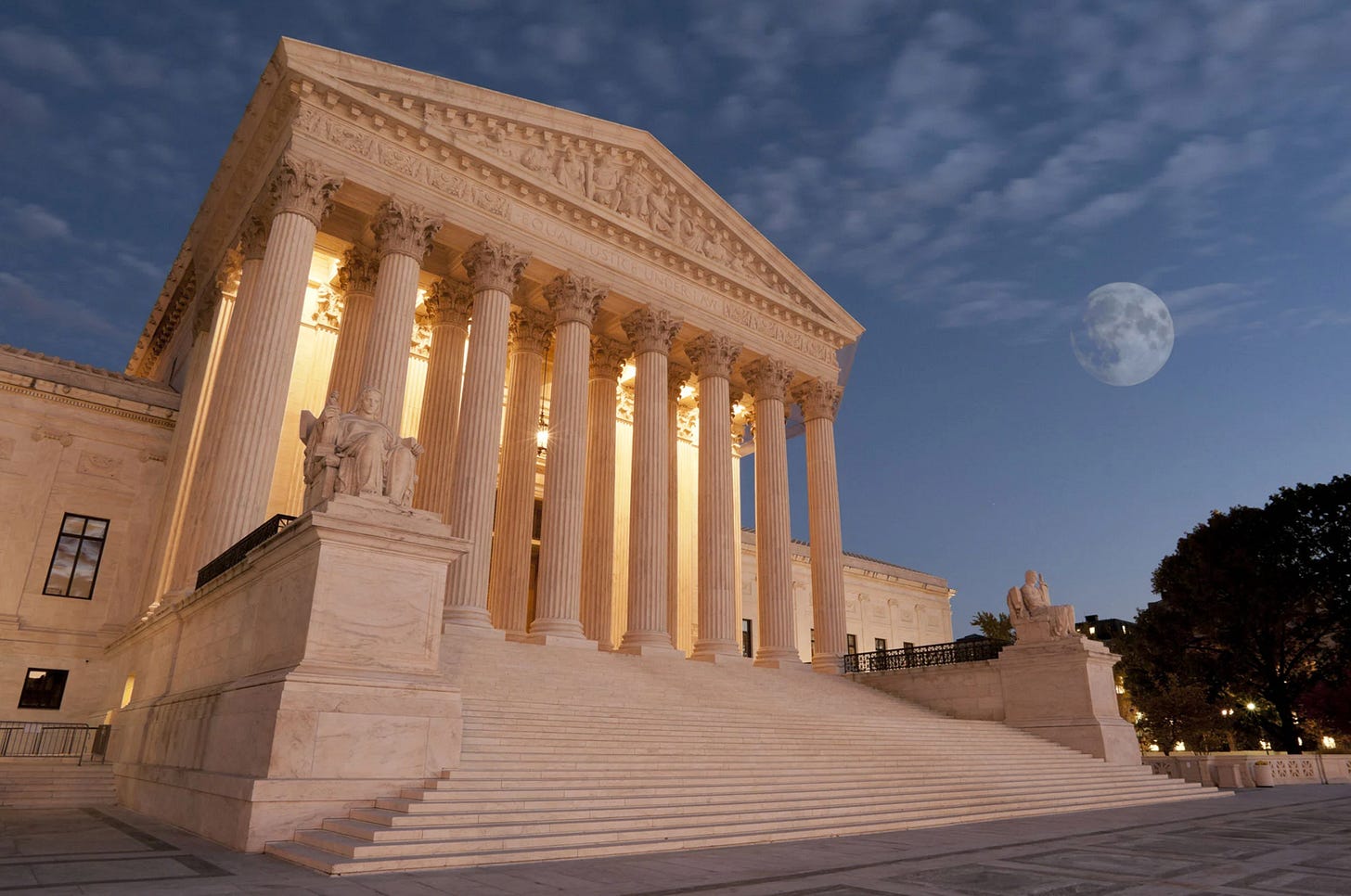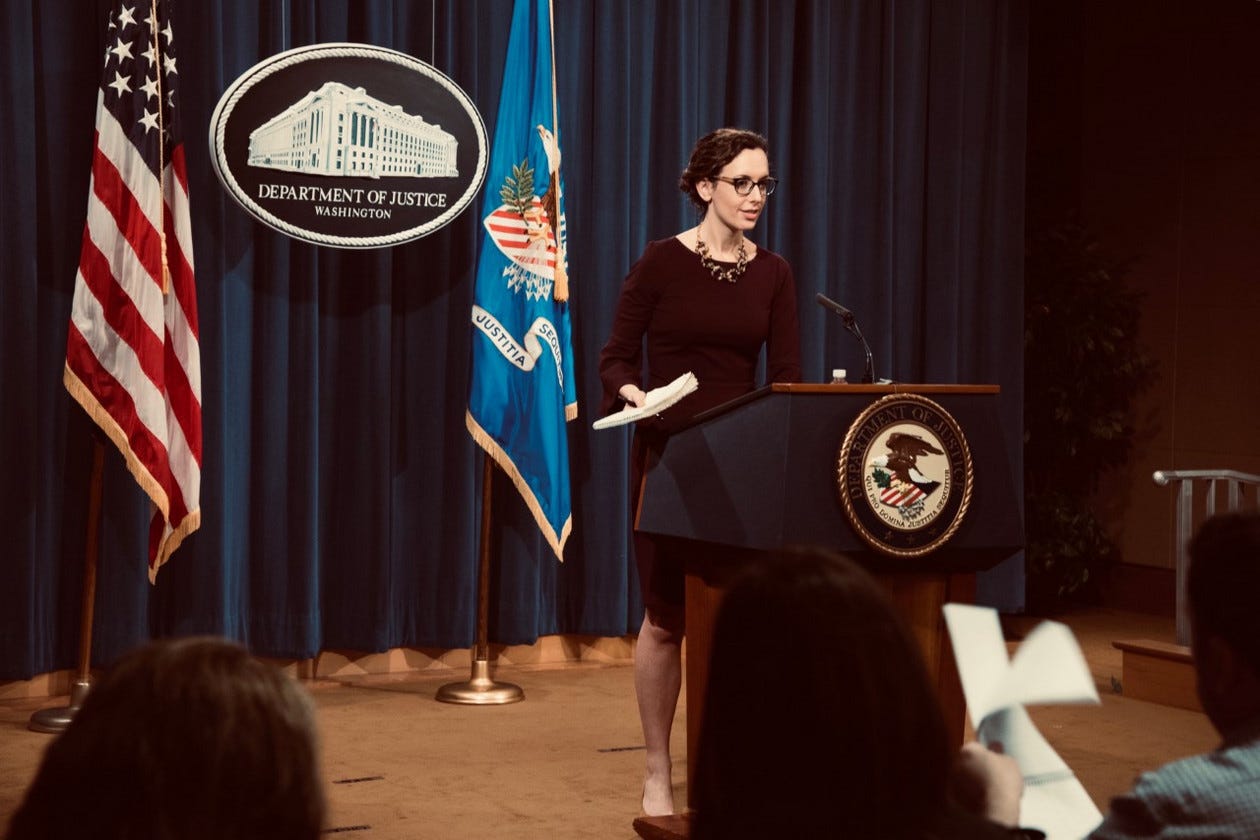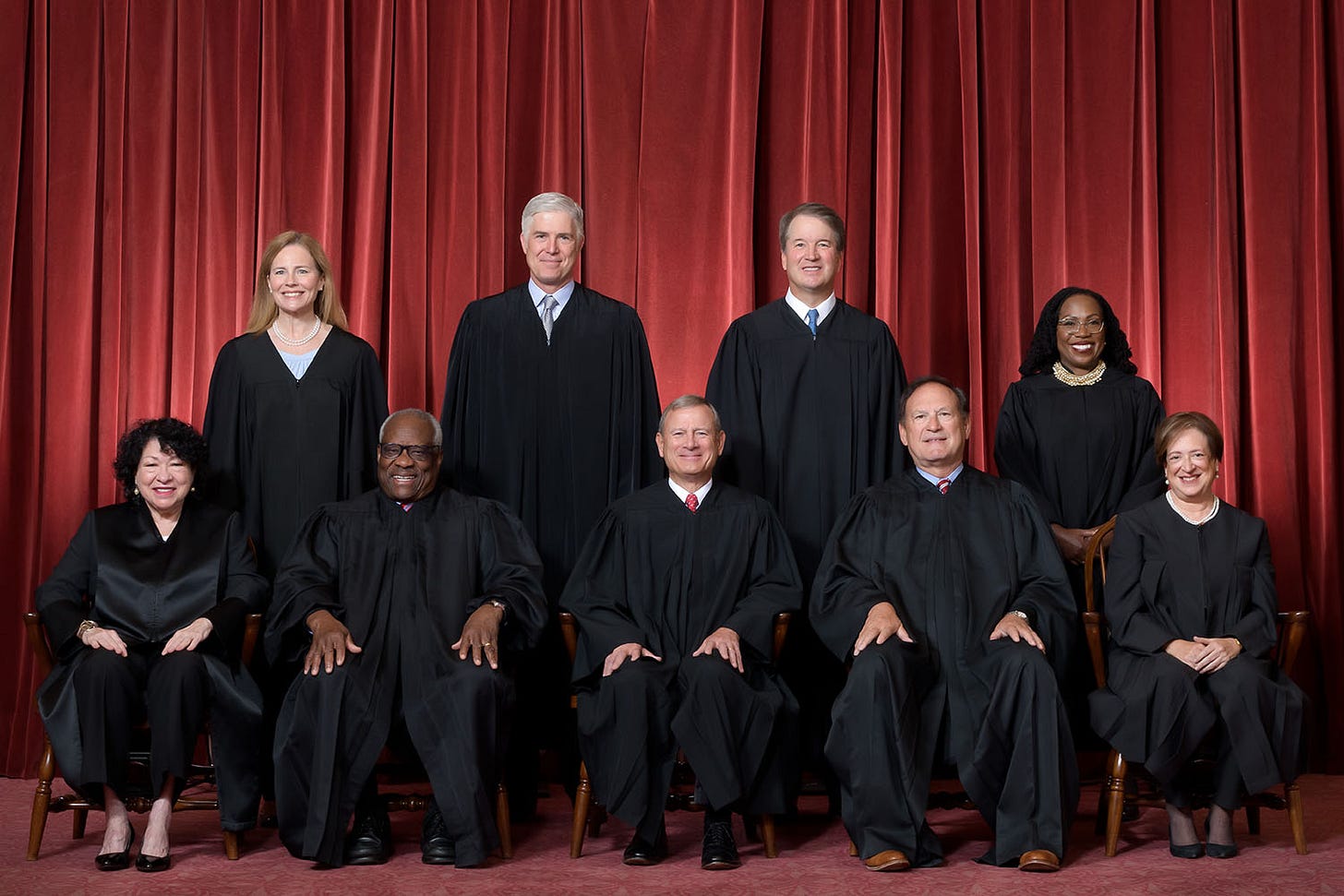Sarah Isgur: Beware Popular SCOTUS Decisions
That, and why she doesn't think the Supreme Court needs reforming
Today is the first Monday in October, which means it’s the start of the next Supreme Court term.
I reached out to Sarah Isgur, a senior editor at The Dispatch and the host of Advisory Opinions, a popular legal podcast. Sarah is also a Harvard Law School graduate who has worked in all three branches of government, been a part of several presidential campaigns, and served in the DOJ during the Trump administration.
She had been a skeptic of Trump before joining his administration. She said she took the job in an attempt to “temper his worst instincts” and admits she thought she was “saving the country” when in reality she and others who worked for him only masked the “absurdity of the Trump administration from voters.”
Sarah says Trump showed no interest in the law, and looked at the Justice Department with more of a “what can you do for me” attitude than one of a president who cares about upholding the laws of the land.
During his four years in office, Trump appointed three Supreme Court justices, which created a conservative majority, who later fulfilled his promise to overturn Roe v. Wade in their ruling in the Dobbs case, which took away the federal right to abortion. They also granted him broad immunity last term.
Many Americans say they personally felt the impact of these rulings. Their lives were changed, for better or for worse. This new term has fewer “hot button” issues on the docket, but Sarah points out every case affects someone.
With Sarah’s legal background and experience, I wanted to get her perspective on this upcoming term, the Court itself, what trends to be on the lookout for, and why she doesn’t believe the court needs to be reformed, despite the Court’s low approval rating.
What big issues will the Court tackle?
Sarah: As of now, there aren't as many of what my old law professor used to call "hit parade" cases in the queue. Of course, it’s hard to define big cases without some circular logic: The big cases are the ideologically divisive ones and the ideologically divisive cases are the big ones. Which is why I've argued that focusing on the "big cases" can be counterproductive when trying to understand the Court.
That being said, there's plenty of issues that aren't specifically case related that I'll be watching.
For example, the justices on the Court have said that the Court will look to "text, history, and tradition" to decide whether a given law comports with the Constitution, but they don't seem to agree on what exactly that phrase means.
And then there's the justices. Justice Barrett was in the majority over 90 percent of the time last term, but toward the end, she seemed to break with the other conservative justices in some very high profile cases like the Trump immunity decision.
Was that a coincidence of timing? We'll see!
Can you tell us some of the cases you are watching most closely and tell me why the average American should care about these cases?
Sarah: As of now, the most contentious case the Court is set to hear is about whether states can ban gender affirming care for minors. It really pits parental rights against the power of the states to make laws aimed at protecting children.
So for example, lots of states have laws that prohibit minors from getting tattoos or how old you have to be to get your ears pierced. Is this different because it's health care? Does it matter whether there is consensus among doctors about whether puberty blockers or surgery are required for minors?
Does a law like this discriminate on the basis of gender identity because a girl is allowed to get breast reduction surgery if she's doing it because her back hurts but she isn't allowed to get the surgery if it's to affirm a male gender identity?
Lot's of states have passed similar laws, so this case will be closely watched. There's also cases on the death penalty, ghost guns, and age restrictions for pornographic websites.
Everyone always wants to know how these cases are going to affect them. Will their lives be changed by a decision made by SCOTUS?
Sarah: I'm so glad you asked, because this is why it's really hard to define what a "big case" is. There is always someone in my X feed who suggests that the unanimous cases “shouldn’t really count” when we consider the court’s important cases.
This past term, that would have meant excluding the Texas and Florida social media decision, the mifepristone abortion drug decision, and the NRA’s First Amendment decision.
Or when the Court upheld Sec 2 of the Voting Rights Act and it wasn't along ideological lines – nobody really cared because it maintained the status quo and it didn't fit the narrative of all Republican appointed judges on one side and all the Democratically appointed judges on the other. But if the Court had struck down the VRA, it would have been a big deal, right?
The Dispatch provides engaged citizens with fact-based reporting and commentary on politics, policy, and culture—informed by conservative principles. Through their newsletters and podcasts, they offer deeply reported analysis unavailable anywhere else. More importantly, they created a community and forum for intelligent discussion among the “politically homeless” that’s one of the more high-minded comments sections on the Internet.
Join half a million loyal readers and find your news home at The Dispatch today.
All of the Supreme Court's cases affect someone. A death penalty case may only be about one person but it is whether that person will live or die. A case about administrative law statute of limitations may sound boring but it will affect hundreds of millions of Americans because it's about credit card fees.
I’ve talked a lot about the ethics of SCOTUS. John Roberts bowed to pressure to do something after multiple ethics issues with Justices Thomas and Alito. He created an official code of conduct but stopped short of holding either of them accountable, and there is no method to enforce it. Do you think anything else will be done?
Sarah: I don't think it's that the justices don't want an enforceable code of ethics. It's that nobody has come up with a way to enforce it that would really work.
They're a separate branch of government. So would lower court judges enforce the code of ethics against Supreme Court justices? Who would pick which lower court judges serve on this board? I'm also not convinced we're solving a real problem here.
A lot of the critiques of specific justices seem more about not wanting them on the Court because of their judicial philosophy. The ethics scandals boil down to reporting and whether the previous ethics code required disclosure for certain gifts. Fair enough.
But none of these scandals have had one shred of evidence, for example, that justices were bribed to rule a certain way in any given case. And yet, I think that's the takeaway for a lot of Americans when they see those headlines.
Over the past four years, SCOTUS’ favorable rating has dropped 23 points, and its favorability overall is near historic lows. How much do you think John Roberts and the rest of the Court care about that? Do they take public opinion into account?
Sarah: The Court is – by its nature – a counter majoritarian institution, meaning that they are supposed to protect the rights of the unpopular against the popular crowd. There's a reason these judges have life tenure. It's so they can't be swayed or threatened by popular opinion.
And yet so often the Court's worst decisions are when they are so embedded in popular opinion that they can't see past their current cultural moment. Plessy v Ferguson, which upheld racial segregation, was a popular decision.
Brown v Board of Education, which overturned Plessy 50 years later, led to "impeach Earl Warren" signs throughout the South. So beware of popular Supreme Court decisions! And take a moment to ask whether a decision you disagree with might actually be protecting some right you haven't totally thought about.
But it's also a paradox. The Court has no power to enforce its own decisions. So if the Court becomes too unpopular, the political branches may one day just decide to ignore the Court's ruling. And once that happens, we're never going back. That will be the end of the rule of law in America. And without the rule of law, I'm not even sure what would be left of our system of government.
When you look at the future of the Supreme Court, there’s been talk of expanding it beyond nine justices, imposing term limits, and a code of conduct. What do you think of these reforms?
Sarah: I'm against them because it seems like it's driven by people who don't like the merits of the decisions coming out of the Court. And they don't seem to have a great grasp of history. There was a point in which every justice on the Supreme Court was appointed by Democrats and it led to predictably liberal results for decades.
For the first half of the 1990s, 8 of the 9 justices were appointed by Republicans. This is how it goes. So are you trying to reform the Supreme Court because there's actually a new structural problem… or because you don't like its decisions right now?
I get why the political left doesn't like this Court, but that will change. Maybe sooner than they think. And when it does, they will be the one's arguing that it shouldn't matter whether the Court's decisions are popular and that the legitimacy of the Court is important to the functioning of our system of government.
Too many people want our government to react quickly when in fact it was made to prevent quick changes by transient majorities or mobs. It's frustrating but it's also how we reach compromise and lasting solutions to thorny problems in a pluralistic society.
What do you say to people who say the Supreme Court has moved so far to the right and its rulings are taking us backwards in time? From abortion to environmental protections to gun rights. Is the court out of step with the majority of Americans? And can or should anything be done about it?
Sarah: It's funny because each side hates the Court right now, but they're shocked when you tell them that. Both sides are so focused on what they're losing that they ignore when they're winning.
Let's just take some stats from the 22-23 term, which was the first full term with Justice Kentaji Brown Jackson. About 50 percent of the court’s cases were decided unanimously and that's been about the same for decades. Only five of 57 cases — just 8 percent — were decided 6-3 with the six Republican appointees all on one side and the three Democratic appointees on the other.
Ninety percent of the 57 cases were decided with at least one liberal justice in the majority. Kavanaugh, Roberts, and Barrett were all in the majority over 90 percent of the time, while Justices Jackson, Sotomayor, and Kagan were all more likely to be in the majority than either Samuel Alito or Clarence Thomas.
The three liberal justices voted together in fewer than a quarter of the non-unanimous cases, and the six conservatives voted together only 17 percent of the time. If this were a Court run by conservatives hell bent on changing the law, we'd expect to see them taking more cases and overturning past precedent. But the opposite is happening. They're taking fewer cases than ever before and they're overturning fewer precedents than at any time in the last 75 years.
So beware falling prey to media narratives about the Court. Both sides want to use your outrage so that you'll vote for their political party. But if you pay close attention, there's a lot more going on and it doesn't fit neatly into either side's political narrative.
It’s a point that’s given me a lot to think about: both sides want to use your outrage so that you’ll vote for their political party.
Would love to hear your thoughts in the comments!










I feel like Sarah dodged some of the core problems people have with SCOTUS right now. It’s not just that there’s disagreement with their decisions - it’s that they are making incredibly broad decisions with massive potential to upend the nation.
Overturning Roe has created an avalanche of new cases regarding state’s rights, women’s rights, doctor’s liability, fetal viability, etc. Overturning Chevron causes massive questions about exactly who can make rules and regulations. Presidential immunity opens the door for extreme abusive of power.
Sarah dodges all this by basically saying, “yeah, but if we agreed with every ruling, that would be sorta suspect.” The current SCOTUS concerns are about major upheavals in settled law, not about disappointing partisan decisions.
Fed employee here. I liked her commentary in general but take issue with her argument about the court and ethics. In the end the SC are federal employees, and as such, should be subject to the same rules subjected on all other federal employees. I can't be gifted a meal more than $20 but Thomas can take many expensive vacations without an ethical inquiry? It is not consistent and, as someone else says, regardless of the intent, fed employees must avoid even the appearance of unethical behavior. So should the supreme court justices.